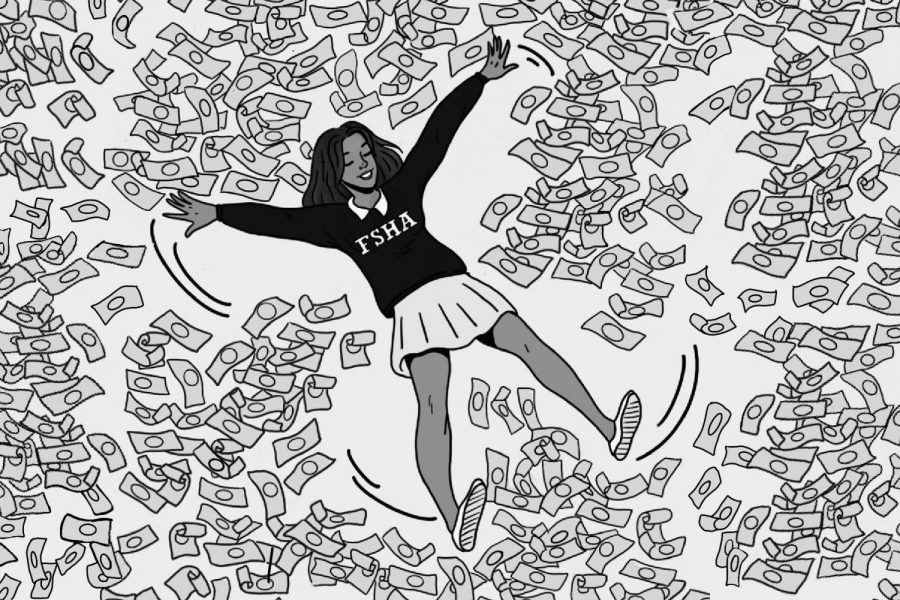Can money buy happiness?
As a girl, Caitlin Cruz ‘22 dreamt about making snow angels in beds of money.
It’s Sunday morning in sunny California, and a partner at one of the best law firms in LA wakes up in her king-sized bed on the second floor of her multi-million-dollar house with her multi-million-dollar ocean view. She slips on her $250 UGG slippers and walks downstairs where she finds her personal chef who has prepared a gourmet breakfast that awaits her on her deck that overlooks the crashing waves. She sits and basks in her last peaceful moments while mentally preparing for the 16-hour workday that’s coming up the next morning.
Meanwhile, on the same Sunday morning in a different part of the same sunny LA, an aspiring writer who works as a barista at a local, struggling coffee shop wakes up on a futon in a studio apartment, her legs half-asleep, as they always seem to end up hanging off the mattress. She slips on her worn-out slippers that she hasn’t gotten around to replacing in years and steps out of her room and into the kitchen, where she finds there is no milk and about 10 stale Rice Krispies left in the box. This doesn’t bother her too much since she is so overwhelmed with excitement about taking her day away from the coffee shop for a full day of writing.
Two people. One has what seems to be all the money in the world but at the expense of slaving away at the office, while the other one is scrounging for breakfast but has the freedom to pursue her passion.
When researching whether money can buy happiness, a study that I came upon time and time again was one done in 2010 by the Princeton University School of Public and International Affairs (formerly the Woodrow Wilson School of Public and International Affairs). The study revealed that money can buy happiness but only up to a point, specifically a $75,000 per year salary. For people making under that number, making more money improves happiness. For people making more than that number, making more money does not improve happiness.
This study inspired lots of coverage in major media outlets. One story about this study, published by The Atlantic in 2010, gathered together a range of journalists to see what they thought about its conclusions.
One journalist thought that lower-income earners experience life’s lows more heavily. She said that low income was not the root cause of sadness but a thing that amplifies sadness related to challenging life circumstances, like the death of a family member. A second journalist emphasized the $75,000 cut-off, expressing that those in high-income brackets aren’t much happier than those in middle-income brackets; the idea is that lavish items like mansions and yachts can not expel misery from one’s life. The last journalist pointed out that the $75,000 figure should be considered flexible since living expenses can vary from place to place.
I spoke with a range of classmates and one faculty member, the Hill’s resident wiseman, physics and engineering teacher Mr. Ty Buxman, to find out what our community thinks money can buy.
“In our culture, people think money buys happiness, but because of that expectation, when we do finally have all this access to all this stuff that money provides, there is this pressure to be happy, and when we are not, it sends us spiraling into the other direction,” Mr. Buxman said.
While some Tologs share that even though money isn’t the only thing that can bring happiness, it does play a part in it.
“To be honest, it doesn’t really have to do with money directly bringing me happiness but rather the way I live,” Allison Risha ‘22 said.
For Risha, money is a way to have both security and a roof over her head, but she knows even with these things there will be times where she can’t always be happy and that money isn’t always the answer.
“Personally, I think money can be very relevant in life, but the benefit I find most valuable that can bring happiness is the experiences it can buy,” Isabella Cao ‘22 said. “Like family vacations and trips — money makes it possible to go somewhere, but it is who you share it with that makes it special, not the money itself.”
For Cao, it is not the money that brings happiness but the company during those experiences that bring joy.
“I don’t believe — or at least want to believe — that money is the only thing that can bring happiness. I think it’s the people we surround ourselves with, and the right ones shouldn’t cost a thing,” Cameron Bender ‘23 said.
After doing a survey of my own with the members of FSH’s community, I realized that the results were not far off from those I found in my research above. Some feel that money and happiness can work side by side, while others think that they should be nowhere near each other, despite what society may have led us to believe.
For me, though, I think money counts for something. If you were to ask me what I would do, be the working lawyer or the aspiring barista/writer, I’d choose to be the lawyer with the personal chef and fancy LA law firm.
But don’t be fooled, I completely understand that there will be bad days when not all the money in the world can boost my mood. And I acknowledge that, if I make a bunch of money, the initial excitement of buying my first steak dinner will wear off and turn into the norm.
That being said, I am still motivated to make money, and here’s why.
Wealthy people seem happier to me. I can’t be certain if it is just the facade that I am buying into, but on many personal occasions, I have witnessed both people with and without money stressed out. The difference is, one can afford to go on vacation or a book spa day to relax, while the other has to find some way to keep pushing forward.
Personally, having access or the ability to afford a mood booster does not seem too bad to me.

Caitlin Cruz is the editor-in-chief. She started freelance writing for the Shield her freshman year, became a staff writer her sophomore year and moved...

